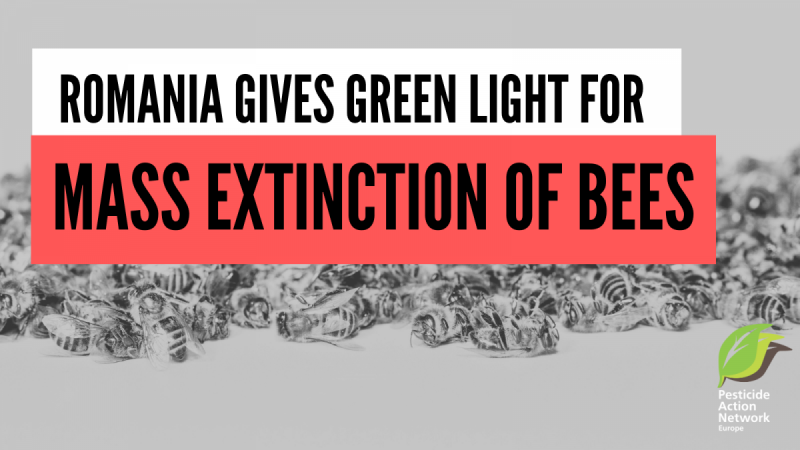Romania does not respect EU law. In January 2023 the European Court of Justice issued a crystal clear ruling: the widespread use of derogations to allow the use of banned pesticides is violating the EU pesticide law. The general use of this emergency provision – until then practised in most EU countries – is not allowed. Most countries accepted the Court ruling and stopped giving new ones. Not Romania. The Ministry of Agriculture recently granted emergency use authorisations for three neonicotinoid-based products to treat autumn cereal grains for soil pest control.
Beekeepers association Romapsis, Eco Ruralis and WWF Romania protested in a letter to the minister of agriculture. The press release they sent received good press coverage in the Romanian press. So far, the Romanian ministry did not reply. However, there was a public reaction from the president of the Academy of Agricultural and Forestry Sciences, Valeriu Tabără. He states that there is no scientific evidence of the harmfulness of the application of seeds treated with neonicotinoids. He also claims that the product breaks down easily in the soil. According to his opinion, crops cannot be grown without it. He concludes that, since the banned insecticides are allowed and used in Ukraine, Romania must also allow it. In his opinion, the 'advice' (sic!) not to use derogations does not take into account the Romanian situation.
The NGOs and Mr Tabără were invited for a discussion in a Radio programme on this subject, broadcasted by the national radio station for agriculture. Tabără stated more strong opinions.
For example, treated seeds cannot affect pollinators, since seeds are buried in the soil. He accused the NGOs of having no arguments to cancel the authorisations. His institution conducted serious research that allegedly offered solid evidence that the neonicotinoids, needed for protecting sunflower, corn and rapeseed, as a condition of obtaining food of good quality at a reasonable price, have NO EFFECT ON BEES. So the NGO allegations are in his opinion “simple fairy tales (povești), based on nothing, only the result of their desperate need to be noticed”.
Fact check
Mr Tabără’s statements are misleading in many ways. International science, as acknowledged by the European Food Safety Authority in 2018, is clear that these 3 neonicotinoids are very harmful to bees and other beneficial insects. That is the reason the EU has banned these insecticides. They do not break down easily and they do accumulate in soil for up to 10 years. From the treated seeds, the substance is spread in the entire plant, from stems to leaves to flowers, nectar and pollen, affecting also the non-targeted soil organisms, important for preserving biodiversity and maintaining the soil fertility. Very low concentrations are already deadly to bees. It appears the „solid research” Mr Tabără refers to looks like a perfect study case for biased "science". It is extremely worrying that the President of the Romanian Academy of Agricultural and Forestry Science makes such unscientific statements that are usually heard only from the mouths of lobbyists from the pesticide industry.
Derogations are not in line with the EU pesticide law and therefore illegal
Another false assumption is that the ruling by the European Court of Justice is ‘advice’. The court does not give a piece of advice, it has declared this kind of derogations is not in line with EU law that must be respected by all EU Member States.
This is clearly understood by the EU institutions. “We think indeed member states can no longer grant emergency authorisations for the placing on the market, or the use of the plant protection products where a decision has been taken to forbid them because of the harmful effects,” explained Claire Bury, Deputy Director at the European Commission (DG SANTE) during a meeting of the European Parliament’s environment committee in March 2023.
The blatant violation of the EU Court ruling by Romania will need to be dealt with by the European Commission, as Guardian of the Treaties. The Commission has the duty to ensure the respect of the rules and a level playing field among EU Member States. As far as we know, no action has been taken yet against the Member States that violate the EU pesticide law. The disrespect of the Romanian and other national authorities for the EU law and the silence of the European Commission allows great harm to bees and other pollinators.
Upcoming event (October): We assist our Romanian partner organisations to organise an event on this topic in Bucharest.
